Befriending the Street Dogs of Dahab
And learning about the people dedicating their lives to them
We see him on our first evening there.
Walking towards our hotel room in the warm January night, we cannot miss him. He’s standing by one of the entrances, sniffing lightly. His eyes are big and brown, curious and calm at the same time. He’s not afraid of us, or any of the other hotel guests. This is the first of many times he will come and greet us, and he is not alone: in the general outdoor area of our four-star hotel in Dahab, Egypt, dogs are frequent and welcome visitors. They walk pensively around the gardens, enjoy the long, colourful sunsets, and wag their tails enthusiastically when I open the terrace door in the mornings.
When venturing into central Dahab, the dogs are impossible to miss. They slumber peacefully on sun-warmed stairs, wander the main road alongside tourists, and are grateful receivers of both ear scratches and scraps of food. On one of our first mornings in Dahab, we see a woman bring out a plate of rice and vegetables to one of the dogs, who happily wolfs it all down. “In this town, we love dogs more than cats!” laughs our taxi driver on one of our trips.
But this wasn’t always the case. The local animal protection group Animal Welfare Dahab recalls that until 2014, the government controlled the street-dog population through mass poisonings. As many animal defenders know, mass killing isn’t effective in controlling animal populations: when food sources become available, the remaining animals move in and breed at a higher speed, creating a “need” for more culls. This vicious killing cycle often fails to result in any meaningful population control - if we truly want to handle the overpopulation of stray animals, the way to go is sterilisation.
Animal Welfare Dahab shares that the first TNR (trap-neuter-return) project in Dahab took place in 2010. This mass sterilisation project saw 58 animals spayed and neutered, which helped control Dahab’s stray dog population. The Animal Welfare Dahab organisation carries out this work still today - in fact, we did not see a single stray puppy during our time in Dahab, only adult dogs, which indicates that not many strays are born in the city.
While some locals might still be hostile to the dogs, attitudes towards them seem to be much friendlier these days - and that is in part due to the tireless work of British rescuer Anne “Janet” Johnson. After coming to Dahab to be a travel writer, in 2001 Janet witnessed one of the mass poisonings the government still put in place back then. Horrified, she pled with the government to end the practice and rescued as many dogs as she could. From relocating them to safe places to moving them into underdeveloped, abandoned buildings, Janet made it her mission to save as many dogs as possible, becoming the most prominent animal rescue worker in the entire South Sinai area.
Janet lived in Egypt for 16 years, setting up an animal shelter in an outdoor area, housing as many stray animals as possible and fundraising for their care. Following her death in 2020, Janet’s legacy still lives on - her shelter, Janet’s Wadi (literally meaning “dog valley”) still operates, providing rescue, rehabilitation, veterinary assistance, and facilitation with adoption. At the time of Janet’s passing, the outdoor shelter she ran was home to over 200 animals: mostly dogs, but also cats, horses, rabbits, and a donkey. Some of these animals have been rehomed, others have passed away due to old age, and many are still at the outdoor facility in the valley.
I walk up to The Vegan Lab, my favourite plant-based restaurant in Dahab. A Labrador-looking dog lies in front of the door, contemplating the world. “Do you want some food to feed him?” a staffer of the restaurant asks me. I nod enthusiastically - but much like the first dog, the one chilling outside our hotel room, this one doesn’t seem that hungry. Could be because it’s all vegan food, sure - but the impression I’m left with is that Dahab’s street dogs are well fed.
I talk to Karin Bavinck, who has been the coordinator of Animal Welfare Dahab for over a decade. Her work is full of both hope and frustration.
“One positive is that since our agreement with the city council not to poison dogs (if we continued neutering) ten years ago , the city council has mostly kept its word, although we have to keep renegotiating with a newly reinstated mayor. Due to this agreement, we see a more stable population, meaning also many elderly dogs over ten and even fourteen years of age. This is unique for Egypt.”
But it’s not all sunshine and doggy treats: “The stray dog population would have stabilised if not for more Egyptians and bedouins taking dogs and then dumping them or their puppies, and people from Caïro bringing dogs to Dahab because Dahab has got this fame of being a dog paradise. So instead of having fewer dogs to neuter, the numbers stay the same or even increase. Also, as Dahab gets busier and more crowded it gets more difficult for the dogs. There is less space and more aggression towards the animals.”
One of our last days in Dahab, a golden retriever-looking dog comes up to our hotel room terrace. He is the epitome of a happy dog: tail wagging, full of energy, eyes sparkling. He approaches us in a curious and friendly manner, licking my hands as I scratch his back. Another dog, a short-haired black one, follows him, dropping down eagerly for belly rubs. It would be easy to say that Dahab’s street dogs are looked after, loved, and happy. But as I leave this city, I know that things aren’t necessarily that simple. I’ve worked in animal rights way too long to let myself be fooled. However, it seems that hope blossoms more here than anywhere else in Egypt when it comes to stray animals, and that’s yet another reason why I feel so lucky to have visited this magical little corner of the country.
Support Animal Welfare Dahab here
Support Janet’s Wadi here


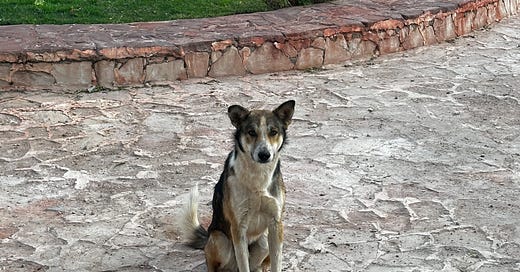


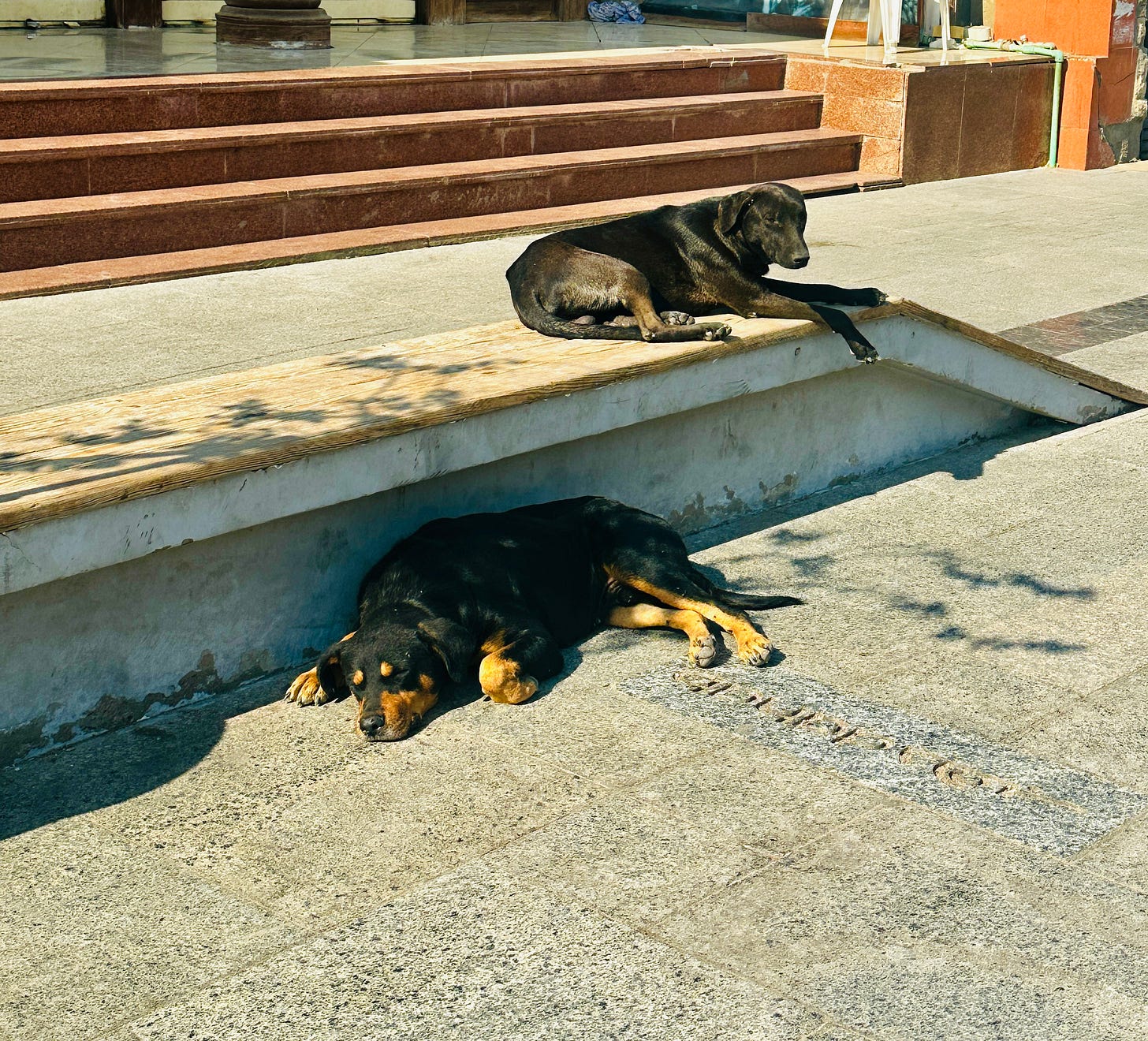
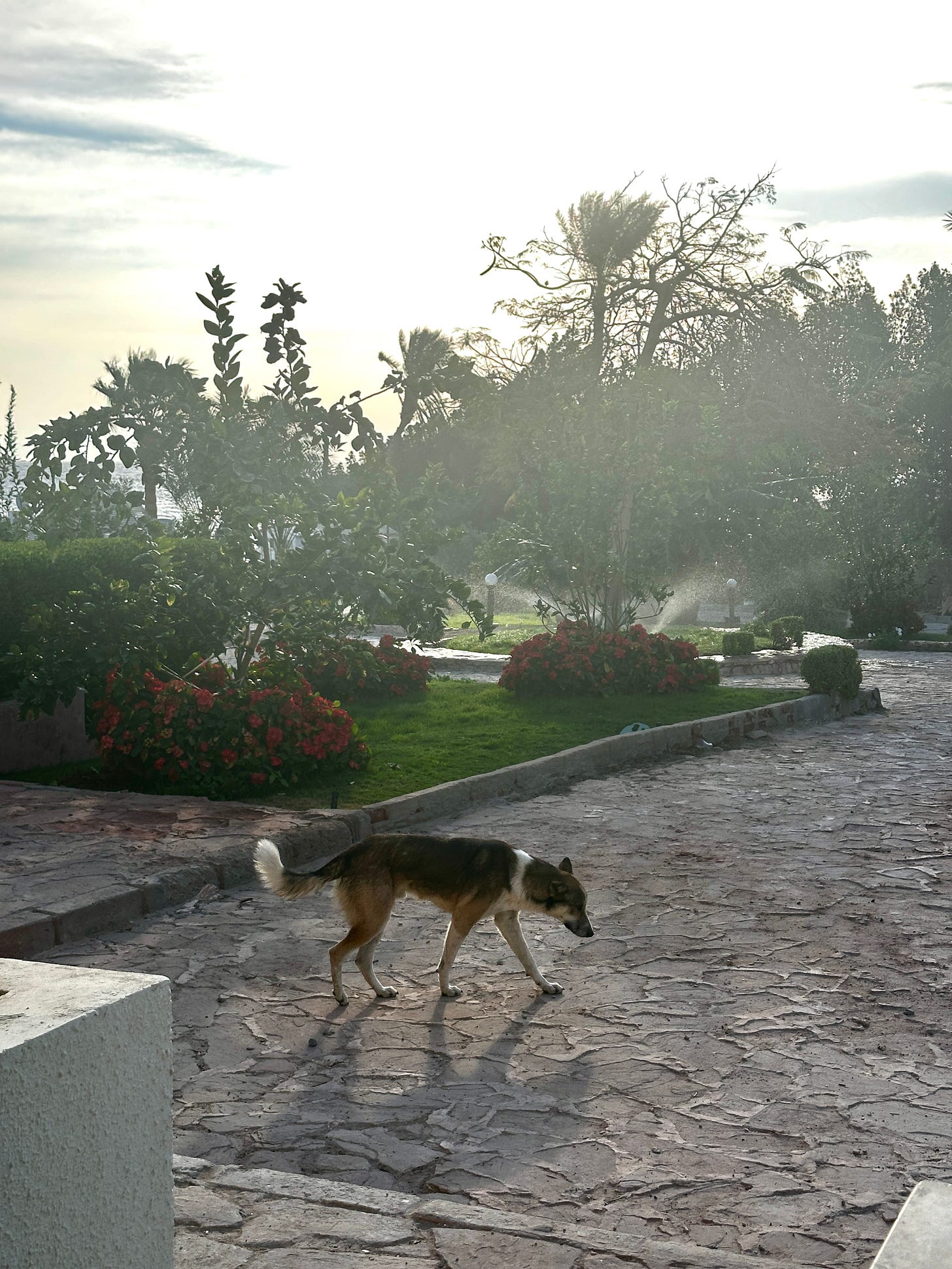
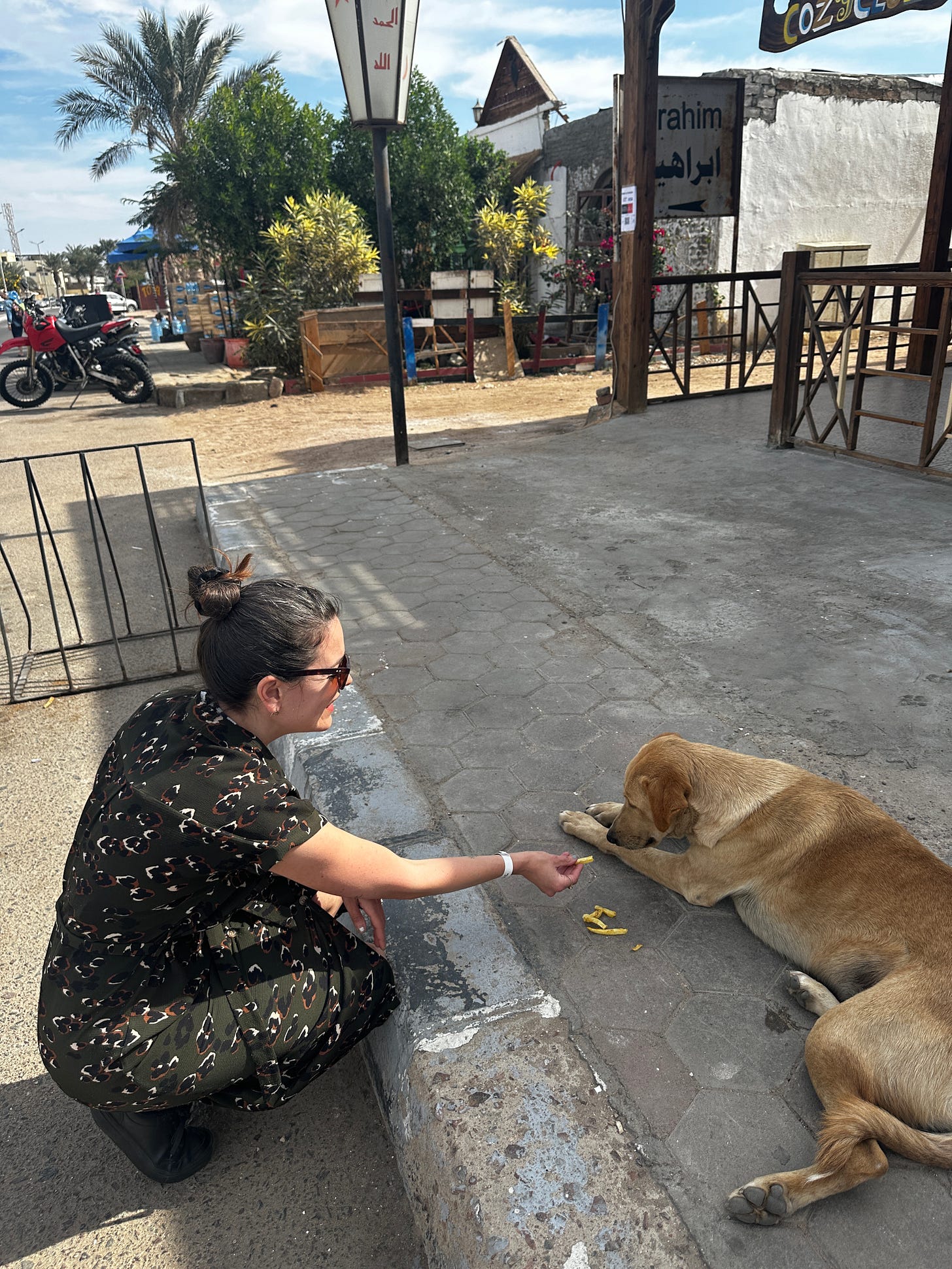
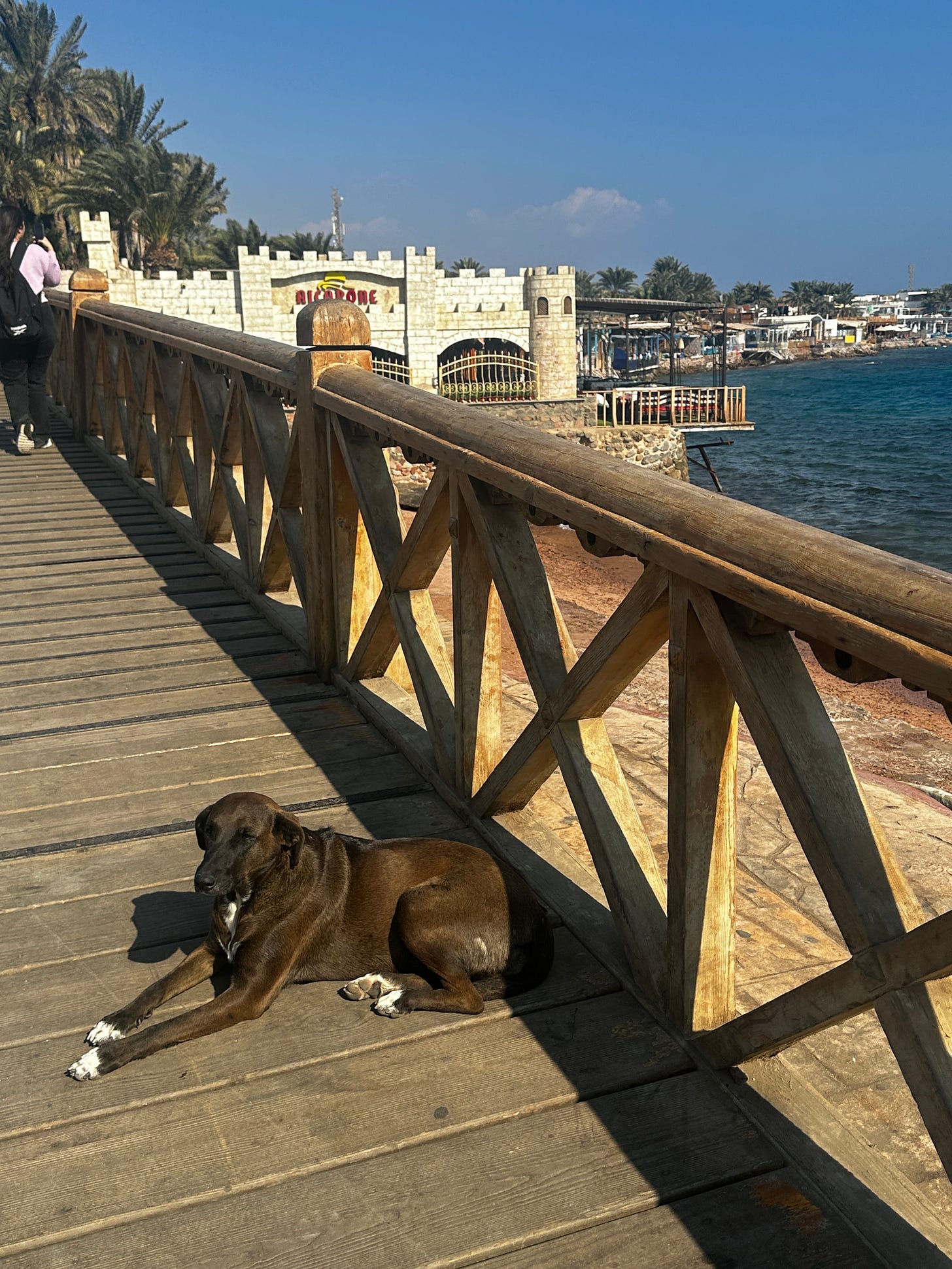
What lovely photos! It must be so nice to be surrounded by animals in that way. And really interesting to hear about the way they are dealing with the stray population - so glad to hear they are moving away from cruel mass poisonings to more effective and ethical practices. Hopefully other places are taking note!